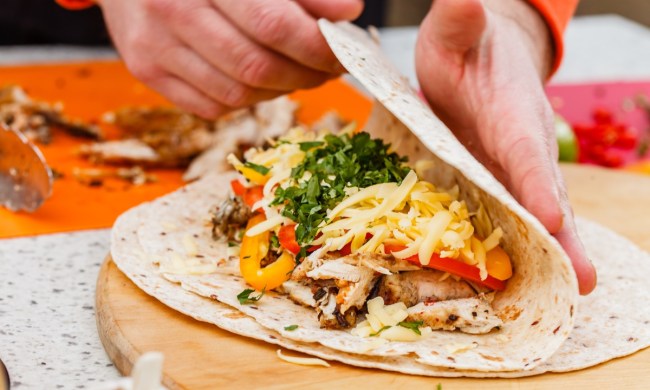Eating healthy can be hard, especially once those late-night cravings set in. However, it is possible to get your fix without derailing your diet. Nutritionist Monica Auslander Moreno, MS, RDN of Essence Nutrition has a few suggestions on what to look for in a healthy snack.
First, look for very little or no added sugar while rejecting artificial sweeteners. Moreno recommends looking out for the ‘health halo,’ healthy-sounding sources of added sugar like maple syrup, honey, organic cane sugar, coconut sugar, invert sugar, and molasses. “A tiny bit is okay, but keep in mind that a teaspoon of sugar is about 4 grams (6 grams for honey) so anything exceeding that is probably not the greatest choice.” If you do want a little sweetener, stick to a teaspoon of real honey or sugar over an artificial sweetener.
Second, load up on protein and fiber: Protein will help you feel full, while fiber balances blood sugar and assists in cholesterol metabolism. “I like to find a snack that has at least four grams of fiber per serving (akin to a handful of nuts).”
Third, don’t shy away from fat. “Fat is filling and required for adequate nutrient absorption,” she points out. However, if it’s from shortening, margarine, vegetable oils, or something fried, she suggests steering clear.
Here are the best healthy snacks nutritionists recommend:

Whisps Cheese Crisps
Moreno is a fan of these light and crispy cheese bites, referring to them as “basically the burnt part of lasagna manufactured into a snack.” There is a variety of flavor options and they go great dipped in hummus or guacamole.
Protein shakes
Moreno also says you can’t go wrong with a high-quality whey protein powder like RSP Nutrition’s TrueFit. “It has a thick and creamy texture with 25 grams of high quality bioavailable, grass-fed whey protein, essential fatty acids, fiber, and pre and probiotics to nourish your gut’s microbiome.”
Biena Snacks Salted Caramel Chickpeas
These “sweet, salty, crunchy sources of fiber, protein, and prebiotic fiber will nourish the probiotics in your gut,” claims Moreno. They taste like that holiday caramel popcorn with an added punch of nutrients.

GinMe Seaweed Snacks
If you are a fan of seaweed, Moreno recommends these seaweed snacks. “They’ll satisfy any salt craving with a nice amount of iodine,” she says. “They pair nicely with a smear of labneh, a fermented cream cheese-like product, and topped with savory spices.”
Hard-boiled eggs
You can’t go wrong with a hard-boiled egg, according to Moreno. “A hard-boiled egg is 6-7 grams of protein so I like to use that as a standard.”
Edamame beans
F45’s Sports Nutritionist Kim Bowman loves to snack on these favorites commonly on the menu at Japanese restaurants. With a whopping 11 grams of protein per 100g, Edamame beans pack a huge protein punch,” she explains. “Containing all of the nine essential amino acids, they are one of the few plant-based complete protein sources.” They also contain fiber and healthy fats, which help keep you fuller for longer.

Full-Fat Greek yogurt
Like most yogurts, Greek yogurt is an excellent source of calcium, potassium, vitamins (like B6 and B12), and gut-healthy live cultures, explains Bowman. What really sets Greek yogurt apart from the rest is its protein content, which is almost double that of regular yogurt. It is also lower in sugar and lactose, making it a little more tolerable for anyone who is lactose-intolerant. ”
Peanut butter
Bowman advocates for eating peanut butter straight out of the jar. “Not only does peanut butter contain 25-30% protein, but it is also full of those healthy polyunsaturated fats that are good for our hearts,” she points out. Reading the label is imperative, though. “If the label doesn’t list peanuts as the only ingredient, put the jar back on the shelf,” she advises. “It is not uncommon to see added sugars, salt, and oils in the ingredients list, so opt for 100% natural where possible to ensure you are choosing the best quality peanut butter possible.”
Cottage cheese
At a jaw-dropping 11g of protein per 100g, cottage cheese is a great snack to have on hand when hunger strikes, says Bowman. “The majority of this protein happens to be in the form of casein, a slow-release protein that takes a little longer for our bodies to digest than whey,” she explains. “Its versatile flavor means you can make your cottage cheese savory or sweet—simply add a few berries and a sprinkle of cinnamon for sweet, or season with your favorite herb or spice to serve alongside veggie sticks for savory.”
Chickpeas
Chickpeas have quite an impressive nutrient profile, according to Bowman. Per half-cup, they contain approximately 8g of protein, 6g of fiber, and a good dose of folate, iron, magnesium, phosphorus, and manganese.
Citrus marinated olives
Brenda Braslow, RD of the top-rated calorie tracker MyNetDiary, suggests marinating some olives in a little bit of citrus, for a deliciously healthy treat. “This crunchy, zesty snack has only 113 calories per serving and is rich in monounsaturated fats that are best for heart health,” she says.
Cucumber yogurt dip
Braslow also shares a recipe for a cucumber-yogurt dip, as well as an easy-to-make low-fat creamy dip great for raw veggies!
Turkey lettuce wraps
This is a super simple, protein-packed snack. Simply take a few slices of your favorite turkey breast and roll them up in a leaf of lettuce.
Hummus and veggies
This tasty treat offers protein and fiber as well as many other nutrients, says Braslow. Just dip your favorite veggies in a delectable chickpea spread and take on the day!


